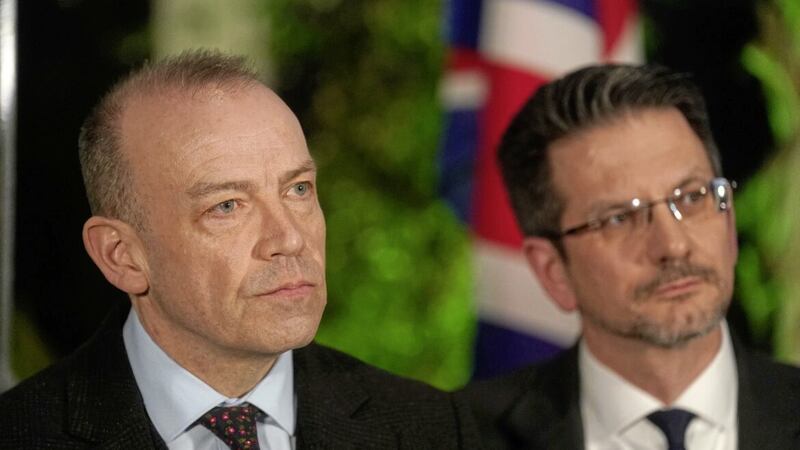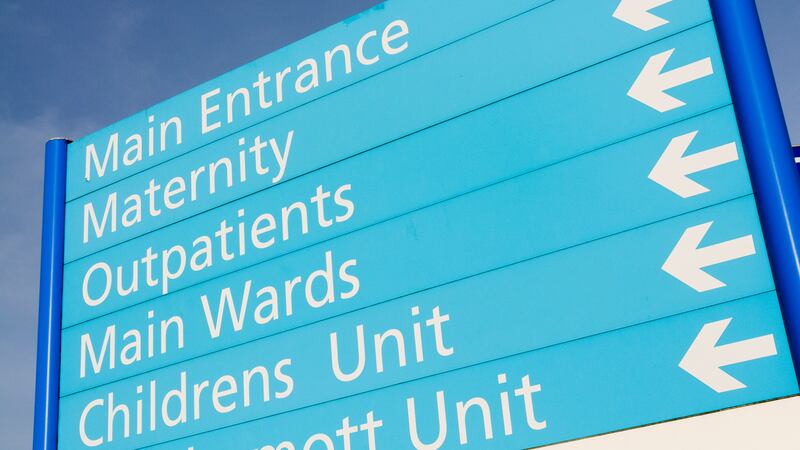SECRETARY of State Chris Heaton-Harris said has said the Windsor Framework represents "decisively taking back control" from the EU.
In a robust defence, Mr Heaton-Harris said that the EU-UK deal would bring "prosperity to Northern Ireland like never before".
"It ensures unfettered access for Northern Ireland made goods to the whole UK market," he said.
There is currently no blocks or checks on goods from the north entering Britain.
He added the `brake' "provides Stormont with the opportunity to reject the application of any harmful new EU rules in the few areas in which they remain".
"As we move forward we will seize every opportunity to diverge from where we are today where it offers benefits to the whole UK.”
Mr Heaton-Harris issued the statement following a day dominated by questions over the internal debate within the DUP.
As leader Jeffrey Donaldson continues to discuss the framework with party members, MP Ian Paisley Jr effectively endorsed the view it should be rejected in its present form.
Mr Paisley penned the foreword to a report, co-authored by the loyalist activist Jamie Bryson, which concludes "further concessions or “components” must be “bolted onto the framework".
"It will be for unionists to determine what those concessions should be but until then, the Windsor Framework cannot be supported by unionists as a solution to the protocol," the report by the recently formed Centre for the Union concludes. Mr Paisley is listed as parliamentary chair of the group.
While Mr Paisley's link to the group and early rejection of the framework appeared to reveal the potential for a divisive debate on the party's positioning, he is seen now as an outlier within the party despite his family pedigree.
"He is almost a Shakespearean drama all his own," said media consultant Tim McKane.
The DUP did not respond to a request for comment on whether there were concerns over Mr Paisley's attachment to the group.
One of the reasons cited in the report for recommending rejection is that it "does not restore and fulfil the Acts of Union 1800”. The report includes legal advice from former Attorney General John Larkin, largely centering on the Act of Union and constitutional issues.
The UK Supreme Court has ruled legislation around the withdrawal from Europe and by extension the NI Protocol supersedes the Act of Union.
The NIO issued a series of "claims" which it then rebutted, most on trade and checks, none relating to the wider core constitutional issues.
Mr Heaton-Harris, in his statement, said: "The agreement rewrites the Treaty to end the presumption of continuing alignment on regulations through the Stormont Brake, puts medicines supply back in the UK’s hands, restores critical tax freedoms and ensures that the same food can be on supermarket shelves in Northern Ireland as the rest of the UK through our green lane.
“And this deal is good for the union as it will bring investment and prosperity to Northern Ireland like never before. We have never said this is the perfect solution, but it is a better option than the Protocol Bill, which kept automatic alignment with EU law for red lane trade at Northern Ireland ports and kept the full jurisdiction of the European Court of Justice in international law."
Meanwhile, a UK parliamentary committee on European Scrutiny has written to UK Prime Minister Rishi Sunak calling on him to appear before it to give evidence on the "Northern Ireland Protocol Windsor Agreement".
The committee also asked Mr Sunak a list of European Union rules that will still apply to the north if the deal is finalised.
In reply to a question in the House of Lords by former DUP deputy leader Lord Dodds on this issue, NIO minister Lord Caine responded: "One of the effects of the Windsor Framework is to reduce very significantly the amount of EU law that will be applicable in Northern Ireland.
"I think the figure is something like 1700 pages of text have been removed and Northern Ireland will now be subject to less than 3 per cent of EU law.
"The brake will apply to new laws that fall within the existing protocol or amendments to laws that fall within the existing protocol."
Meanwhile, veteran unionist Dermot Nesbitt has urged the DUP to "get on the front foot" and tell London that "we want to go back into Stormont...now here's a few things you need to change".
Drawing on more than 50 years in politics, as far back as the days when Gerry Fitt and Brian Faulkner sat down together, Mr Nesbitt said: "It's unpalatable to say yes, but it is disastrous to say no."




